YEAR 10 & 11 2025-2026


YEAR 10 & 11 2025-2026

The vision of Thomas’s London Day Schools is that every pupil leaves with core values and a strong sense of social responsibility; inner strength, outward assurance and positive physical and mental health; academic success and a wide range of skills, interests and attributes; curiosity about the world and a love of learning.
The overall goal of a Thomas’s education is to equip all of our pupils with optimism and readiness for the future, to become net contributors to society, and to flourish as successful, conscientious and caring citizens of the world.
To achieve this, our aims at Thomas’s College are:
• To provide an exceptional and innovative education to young people aged 11 to 18, founded on breadth of experience and opportunity. To enable students to achieve academic excellence through a holistic approach that develops knowledge, skills, character and self-understanding.
• To ensure that every member of our school communities learns and lives by a strong set of values, with kindness at the heart.
• To support students to make meaningful choices about their future, fostering a sense of purpose and personal ownership.
• To promote a diversity of excellence that encourages different types of intelligence, problem-solving and the ability to make connections.
Our curriculum has four underlying strands, developed with inspiration from the Center for Curriculum Redesign:
• Knowledge
• Skills
• Character
• Understanding of self (meta-learning)
What we know and understand Content and outcomes
CONTEMPORARY
TEACHING AND LEARNING
KEY SKILLS
How we use what we know
Scholastic, societal and innovation skills
How we behave and engage in the world
Dispositions, values and habitudes
How we reflect and adapt in C21 Learning to Learn META-LEARNING
© Center for Curriculum Design
©Thomas ’sLondonDaySchools
Together, these develop an enquiry and growth mindset, with students excited by challenge, and unafraid to fail in order to unlock success. They think, question, collaborate and lead. They develop the habits of mind that underpin real-world effectiveness.
Overall our curriculum is intended to allow personal ownership, unlock diversity of talent and achieve the greatest understanding of personal strengths and weaknesses, on which all real-world success is based.

Take ownership, path-find, deepen
In Fifth Form students exercise meaningful choice. They study the Thomas’s Core, including English Language, Maths and Science, as well as a broad programme that takes in Outdoor Education, Volunteering & Community, Psychology & Self-understanding, PSHE and more. In addition they will choose a further six subjects, with at least one from each of our four faculties of learning.
In all subjects apart from English Language and Maths, students also choose the outcome of their learning in Years 10 and 11: either a GCSE in each of their courses, or one of our own Thomas’s Qualifications (TQs). In English Language and Maths, the GCSE outcome is compulsory, as these two subjects are required for university study.
The choice between GCSE and TQ comes later, in the Michaelmas Term of Year 11. In Year 10 students follow content that will prepare them for either option.
* all students study Biology, Chemistry and Physics as part of the core. Students choosing Triple Science will have extra lessons and work towards separate qualifications in all three sciences. Those not choosing this option will work towards ‘Double Award’ - a qualification that covers all three sciences, but is the equivalent of two GCSEs or TQs.
Triple Science
English Literature
Option 1
Option 2
Option 3
Option 4
Option 5
Option 6
Geography
Art
French Spanish Latin
PE
French Spanish
English Literature
Geography
History
Theology & Philosophy
Economics & Business
Art
Drama Design
Music
History
Drama Design
Computer Science
Theology & Philosophy
All students choose one subject from each option block. These blocks have been set to guarantee students the greatest degree of choice, including the requirement to study at least one subject from each faculty. If a preferred combination is not viable from the blocks above, students will be able to indicate their preference on their option forms, as well as telling us about any other subjects in which they may be interested. We will do our best to meet all preferences, but this cannot be guaranteed.
In addition to the six main choices, there are three additional qualifications that can be undertaken at school:
1. Native Language GCSE: native speakers may take a GCSE in their native language if this is a language we can support and they attend a weekly extracurricular club. If the native language is not one that we support in school, then external support may be required. The Languages Department make the final decision over whether a student qualifies as a native speaker, in discussion with families.
2. Further Maths (Level 2): Students may be invited to sit Further Maths during Year 11. This invitation is at the discretion of the Maths Department in agreement with the Senior Leadership Team.
3. Higher Project Qualification (Level 2): Students may be invited to enter for this Level 2 qualification if they demonstrate suitable interest and work ethic in their project work as part of Thomas’s Core. This is at the discretion of the Senior Leadership Team.
Students choose their preferred subjects during Year 9 and start the two-year courses at the beginning of Year 10. In the Michaelmas Term of Year 11 they finalise their choice of GCSE and TQ. Two TQs are completed by Christmas in Year 11, with students studying more completing them in the Lent Term of Year 11. All GCSE exams are taken during the Summer Term of Year 11.
Students can change their mind about their option choices until the end of September in Year 10, in agreement with their teachers. After the end of September, no subject choices can be changed.

During their courses, students will be assessed using the 1-9 scale of GCSE grading in all their subjects, including those they may end up taking to Thomas’s Qualifications (TQs). The image below shows how a student might progress from Year 9 into GCSE grades, although it is rare for a student to make linear progress. During Year 11, when a student makes a final decision about whether they will take a GCSE or a TQ, the assessment will change from numbers to a four-point scale outlined later in this guide if they opt for a TQ.


During the two-year course, all learning will be assessed regularly by teachers. Some of this learning will be assessed formatively, and some will be assessed summatively:
Formative assessment: the focus is on assessing for learning - this is aimed at helping students to make progress and might include comments, a conversation, observation, demonstration etc.
Summative assessment: the focus is on assessment of the learning - this is aimed at giving students, teachers and parents an idea of how well students have remembered what they have been taught and mastered skills they have learned. This might include a percentage, number or grade.
Students will undertake two assessment cycles during Year 10. In Year 11 they will take mock exams in all their GCSE subjects. Final GCSE exams take place over approximately a six week period in May and June of Year 11.
In total, students study ten academic subjects during Year 10, alongside their Core and co-curricular activity:
English Language GCSE (compulsory)
Maths GCSE (compulsory)
Double-award science (compulsory) - counts as two subjects
Six optional subjects
At the start of Year 11, apart from English and Maths, they choose which subjects to take to GCSE and which subjects to take to TQ.
Students may choose a maximum of six optional subjects for GCSE, alongside compulsory English Language and Maths, for a maximum of eight GCSEs. This is the most universities will consider, and concentrating on a maximum of eight subjects supports the best possible outcomes. Students choosing the maximum number of GCSEs will do two additional Thomas’s Qualifications (TQs). These support critical thinking and creativity, which are what universities and other tertiary destinations look for in applicants.
The minimum GCSE requirement is English Language and Maths. Students choosing the minimum number of GCSEs will take eight TQs. In practice, this path may only suit a small number of students - but it will allow those students to thrive and express their talent.
Two Thomas’s Qualifications are completed before the end of the Michaelmas Term in Year 11. This allows all students to focus on their eight remaining subjects after Christmas. All TQs are complete by the end of the Lent Term, allowing a focus on GCSEs only in the Summer Term.
What is involved in Thomas’s Qualifications (TQs)?
TQs are very different from GCSE exams, and allow much more creative freedom. In each TQ subject, students choose one of four forms of assessment:
TQ: Connect
An extended piece of writing across a minimum of three school subjects and a minimum of two faculties of learning.
TQ: Create
A creative artefact in any medium, and a portfolio
TQ: Analyse
An informative exhibit, and a portfolio, explaining a complex subject
TQ: Communicate
A public presentation, and a portfolio, to inform and argue a case
Grading
TQs are graded as follows:
Thomas’s Qualifications (TQs) are being designed and developed to meet the emerging needs of academically able, socially aware and globally minded students. They are unique to Thomas’s. While we will look to gain external recognition and ratification for TQs, so that they can be included, for example, on UCAS forms, most students will gain their recognised qualifications via a mix of GCSEs, and later from A Levels and AS Levels.
What students gain from TQs, alongside their traditional qualifications, is future-ready learning: exactly the additional skills and evidence of creative thought that the most competitive university and other outcomes require.
TQs enable Thomas’s College students to practise while at school the type of assessment and challenge they will face in tertiary education and the workplace, allowing them to get ahead in the transition from school study to real-world learning.
The following grades will be included in the students’ reports during Years 10 and 11 where the outcome is intended to be the GCSE examination:
Forecast grade
Current grade
The grade viewed by the teacher as most likely for the student to achieve at the end of the course based upon all the evidence that they have (classwork, homework, tests and effort).
The grade at which the student is working currently, based upon all evidence that the teacher has (classwork, homework and tests).
You will also be able to refer to the results of the Cognitive Abilities Test taken upon entry. These grades include:
CAT indicator
CAT if challenged indicator
The grade viewed by the teacher as most likely for the student to achieve at the end of the course based upon all the evidence that they have (classwork, homework, tests and effort).
The GCSE grade generated by their most recent CAT test, assuming the student makes above average progress. This grade will not change (unless a student takes another CAT test).
These grades can be useful indicators for outcomes, although with hard work, it is possible that students can achieve significantly above these grades. Likewise, students may achieve below these indicated grades if they do not work hard or have high levels of absence.
Where students have chosen to take a TQ in Year 11, reporting will follow TQ grading as outlined earlier in this guide, with forecast and current grades.
Reports will also include an effort grade using the following rubric:
• Actively engages in discussions and activities.
• Demonstrates consistent focus and attentiveness.
• Consistently encourages and supports classmates
• Completes all classwork and homework to a high standard and participates in extension and consolidation tasks.
• Takes a proactive approach to learning.
• Challenges themselves outside of their learning comfort zone.
• Uses technology to transform learning.
• Participates in class activities adequately.
• Generally attentive in class.
• Completes all classwork and homework to a high standard.
• Collaborates with classmates when appropriate.
• Follows instructions and completes tasks on time.
• Uses iPad to support learning.
• Demonstrates focus in the majority of lessons.
• Completes most classwork and homework assignments.
• Occasionally disrupts class with off-topic conversations.
• Requires reminders to stay on task and of classroom expectations.
• Shows limited participation in group activities.
• Occasionally uses iPad to view a site or document not signposted by the teacher.
• Is disruptive in the majority of lessons.
• Rarely completes classwork and homework assignments.
• Fails to follow instructions consistently.
• Mentally truant during lessons.
• Shows a lack of respect for peers and the learning environment, talking over others and shouting out.
• Uses iPad to disrupt or disengage from learning.

Every student studies the Thomas’s Core. This includes:
• English
• Maths
• Games & sport
• PSHE
• Careers & futures
• Volunteering, community & outdoor education
• Projects
• Psychology & self-understanding
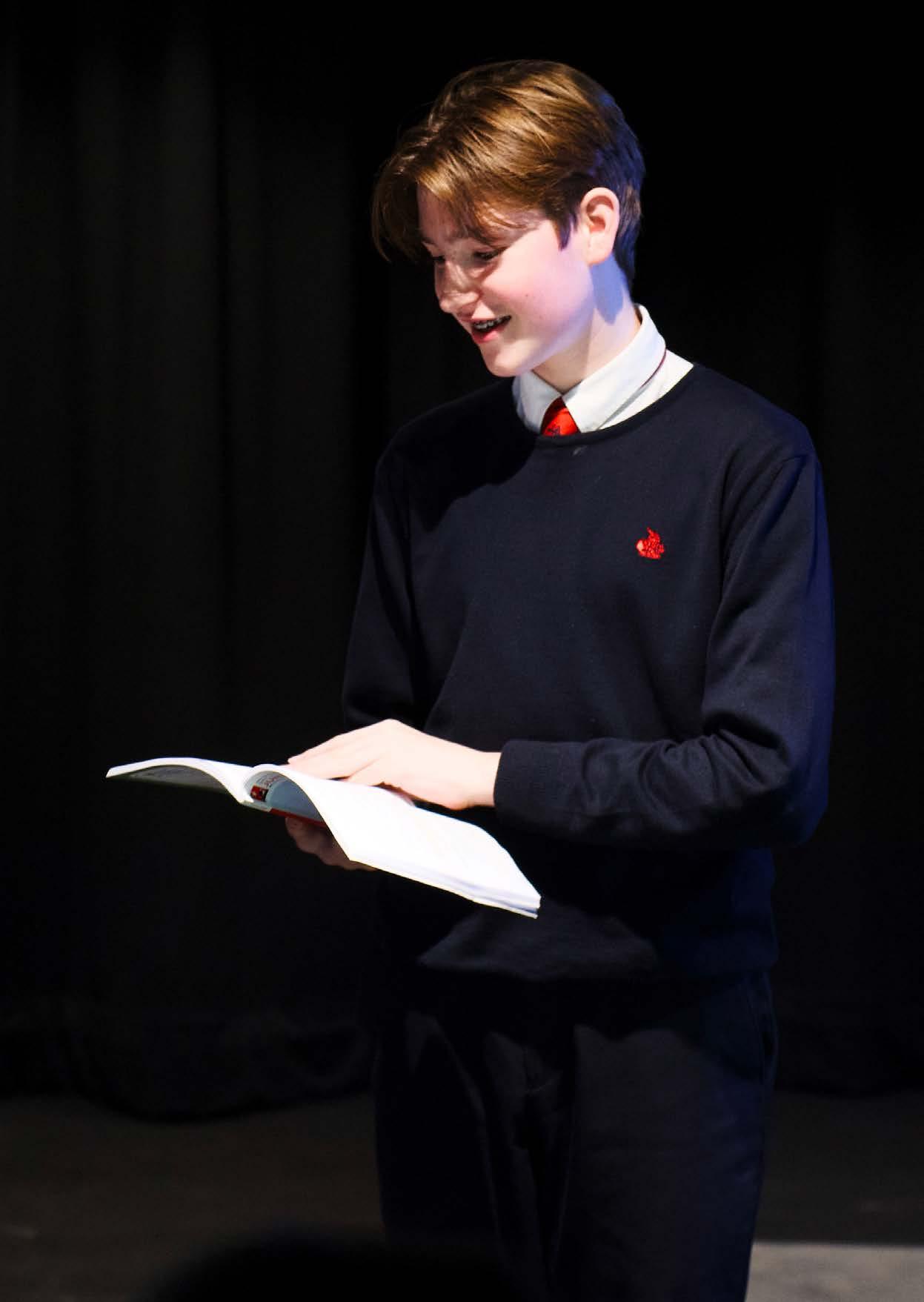
Studying English Language at GCSE equips you with essential skills crucial for your academic and professional futures. In fact, it is considered so essential that some further education providers will not even permit you to enrol with them unless you have at least a Grade 5 at English Language GCSE.
Through the study of fiction and non fiction texts, you learn to analyse language critically, identify opinions and perspectives and understand how writers and speakers use language in order to convey ideas - and also to manipulate the reader. This ability to analyse is essential knowledge in today’s Information Age, as we all sift through mountains of information to identify fact from fiction, truth from misinformation, opinion from propaganda. Furthermore, in studying this course you gain the skill of conveying your ideas in an appealing manner, engaging audiences and succinctly getting arguments across through your writing and speech. The ability to engage with, and respond to, audiences is an essential work skill in every environment - from sport to science, fashion to finance, law to landscaping. Whichever field you choose to enter in the future, the skills you acquire through the study of English Language will empower you to excel.
Where can English take you?
Helps towards degree courses in…
English
Humanities
Philosophy, Politics and Economics (PPE)
Psychology
Law
Social and Political Science
Anthropology
Education
Linguistics
Liberal Arts
Helps towards careers in…
Law
Teaching
Government
Marketing
Public Sector
Politics
Journalism
Publishing
Film production
Theatre production
What will you study when you study English?
Paper 1 - explorations in creative reading and writing
Section A: Reading
- one unseen fiction extract
Section B: Writing
- descriptive or narrative writing
Paper 2 - writer’s viewpoints and perspectives
Section A: Reading
- two non-fiction texts including writing from the 19th century and 20th or 21st century
Section B: Writing
- transactional writing or writing to present a viewpoint
Spoken Language Endorsement
- Presentation on a topic of your choice
How will you be examined?
Language has two papers, each lasting 1 hour 45 minutes, with 50% weightage each. Additionally, there’s a Non-examination Assessment in Spoken Language, evaluated by teachers.











Studying GCSE Maths will give you the knowledge to tackle scientific, mechanical, coding and abstract problems. It will also help you develop logic to tackle everyday issues like planning projects, managing budgets and even debating effectively.
Helps towards degree courses in…
Economics
Mathematics
Biological Sciences
Human Sciences
Chemistry
Physics


Helps towards degree courses in…
Accountancy
Medicine
Public
Sector
Business
Marketing
Insurance
Economics
Teaching
Consultancy
Michaelmas
Unit 1: Number
Unit 2: Algebra
Unit 3: Interpreting and Representing Data
Unit 4: Fractions, Decimals and Percentages
Unit 5: Angles and Trigonometry
Lent
Unit 6a: Graphs
Unit 7: Area and Perimeter
Unit 11: Multiplicative Reasoning
Unit 9: Equations and Inequalities
Unit 10: Probability
Summer
Unit 8: Transformations and Constructions
Unit 12: Similarity and Congruence
Unit 13: Further Trigonometry
Unit 14: Further statistics
Unit 15: Equations and Graphs
Michaelmas
Unit 16: Circle Theorem
Unit 17: Further Algebra
Unit 18: Vectors and Geometric Proof
Unit 6b: Graphs
Unit 19: Proportion and Graphs Lent
Revision Term Summer GCSE Exams
Which exam board?
• Edexcel
Paper 1: Non-Calculator (33.3%)
• Written examination papers with a range of question types
• No calculator is allowed
• 1 hour and 30 minutes
• 80 marks available
Paper 2: Calculator (33.3%)
• Written examination papers with a range of question types
• Calculator allowed
• 1 hour and 30 minutes
• 80 marks available
Paper 3: Calculator (33.3%)
• Written examination papers with a range of question types
• Calculator allowed
• 1 hour and 30 minutes (both Foundation and Higher tier papers)
• 80 marks available
Which resources will be required?
All students will need the Casio fx-83GTX model of calculator and a geometry set comprising a ruler, protractor and pair of compasses. They will receive a personal account with the online website Sparx Maths.
Textbooks:
• Edexcel GCSE (9-1)
Higher Mathematics
Workbooks / revision books:
• Edexcel GCSE (9-1)
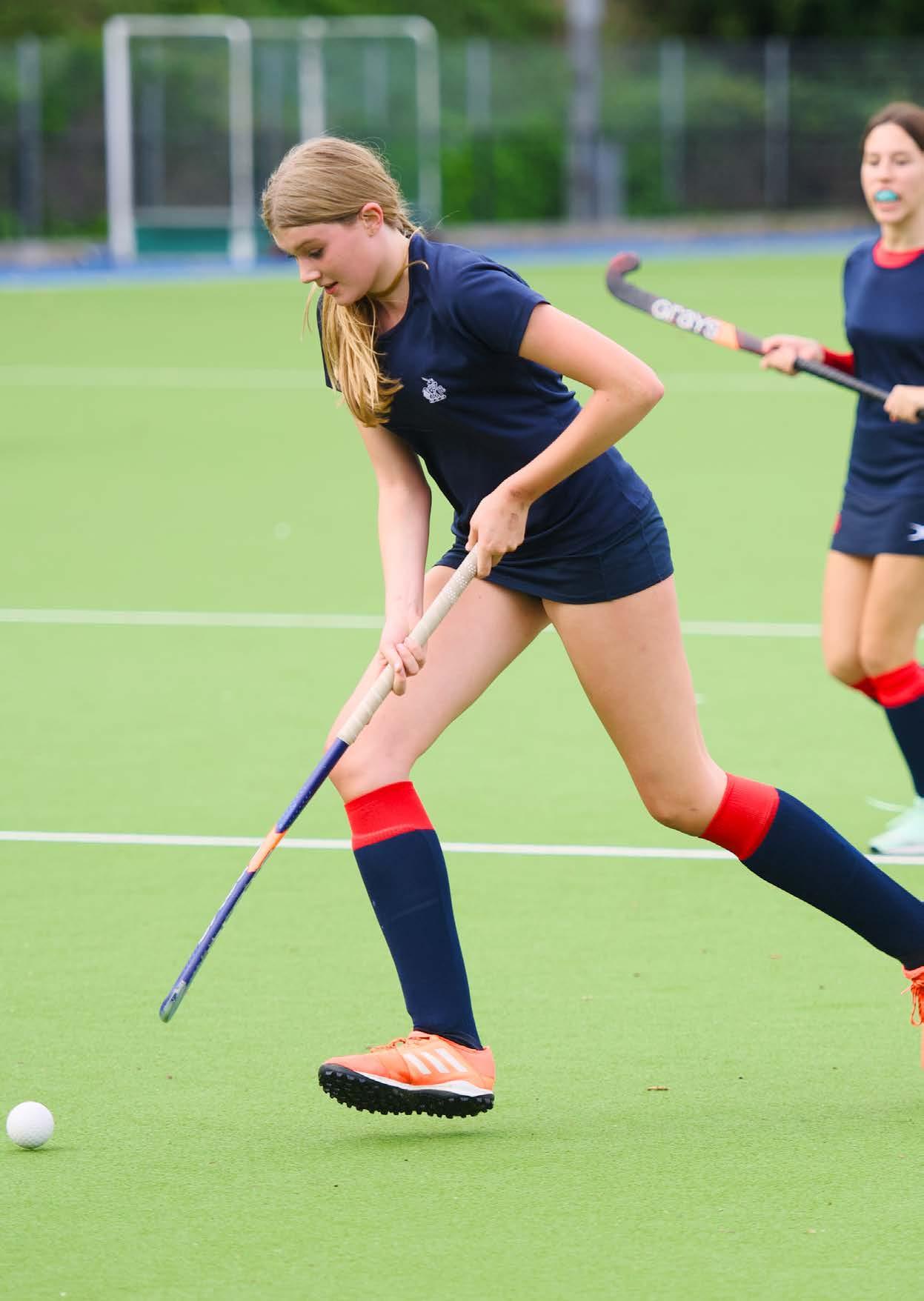
The Sports Department at Thomas’s oversee all aspects of physical activity with the aim of all students leaving with a healthier outlook on life. We will provide them with the skills, understanding and appreciation of what’s needed to lead a healthier lifestyle.
Games afternoons: each year group will have a games afternoon where they will have the opportunity to develop skills, teamwork and tactical awareness in one of our focus sports.
Fixtures against other schools are arranged in games afternoons with all students having the opportunity to represent the school. Saturday fixtures will also take place. The expectation is that if a student is selected to represent the school on a Saturday, it is part of the school week and the student is expected to attend.
A wide range of sports are also available as clubs and activities.
PSHE (Personal, Social, Health and Economic Education)
Students will continue taking part in PSHE sessions during Core time twice weekly. The topics covered in this subject area will extend the learning from Years 7, 8 & 9. These include human rights, mental health and ill health, keeping safe online and decision making. The statutory Relationship and Sex Education Curriculum will be taught during these sessions. We have a focus on educating students about their rights and responsibilities, how to develop and maintain positive relationships and how to navigate life.
Careers teaching aims to give all students the knowledge they need to make the right choices about their immediate and later futures. It uses online platforms that give guidance tailored to the individual child’s learning and needs and introduces them to a range of new ideas in this area.
Building on the work done in Year 9 that looks at how the skills and experiences they have will feed into further study and employment, Year 10 students then take a more detailed look at the types of jobs that are available and start to think about which might be best suited to them. They continue to develop wider life skills and apply these in a real world setting through work experience placements completed at the end of the year. To prepare for this they learn about a selection of workplace skills such as appropriate management of social media, diversity, professionalism and wellbeing. Year 11 focuses again on the academic choices they have made and extends the thinking around this to enable them to make informed decisions about their post 16 education. They learn about A Levels, BTECs and Apprenticeships and again tie all of this to different career opportunities. The curriculum also provides advanced workplace skills training and gives them access to visiting career specialists, employers and employees in a range of professional areas.
Students will have the opportunity to engage in a range of volunteering & community projects as part of the Core programme. They will also continue with Outdoor Learning, with up to three outdoor adventure days over the Michaelmas term, building on the successes of the Year 9 programme. Both aspects come together in the Duke of Edinburgh (DofE) Silver Award.
The outdoor learning days will focus on teamwork, self-reflection and personal challenge. The initial outdoor adventure day will assist students in building new connections with starting students as well as strengthen existing friendships to facilitate a memorable experience. The focus will be on physical and mental wellbeing, character recognition and understanding.
Day two will run as a split day, encompassing a morning activity before the Silver DofE Award is introduced and an information session giving students an option to opt into the programme. Day three is designed for those who have opted in, with the attending group taking part in three activities to enable the group to start the process of designing their own expedition programme, utilising staff expertise and experience to choose from a walking, sailing or canoeing DofE Silver Expedition. The optional third day will take place on the INSET day in November.
For those wanting to continue with the Silver DofE award, the focus will be on providing students with developmental opportunities from which to create their own expedition, giving them ownership and responsibility for the planning, and delivery of the training and assessed expedition.They will have two years to complete the volunteering and skills based section with the expedition elements happening in the Summer Term.
Students will explore an area of their own interest that is not linked to an area of GCSE study and create their own project. This may lead to an additional Thomas’s Qualification (TQ) if they wish. Some students will be invited to consider taking their project to the national Higher Project Qualification (HPQ). The HPQ is A Level 2 qualification, which is the equivalent of half a GCSE, and is an excellent way for students to extend and develop beyond the material being covered in class and to explore their passion for a subject, while acquiring another nationally recognised qualification..
As part of their Project learning, students will have opportunities to acquire and apply a range of skills:
• researching, analysing and evaluating information
• developing and justifying a line of reasoning
• reflecting on processes and outcomes
• communicating information and reasoning
• collaborating to achieve a common outcome
A unique aspect of the Thomas’s Core, taught sessions in psychology and selfunderstanding will help students learn about themselves and how they learn. This includes, but goes well beyond study skills. Everyone has their own strengths and weaknesses and by learning about these different types of intelligence, students will be able to achieve at their own personal best level and get a clearer sense of their preferences for the rest of their education and looking ahead to their futures.
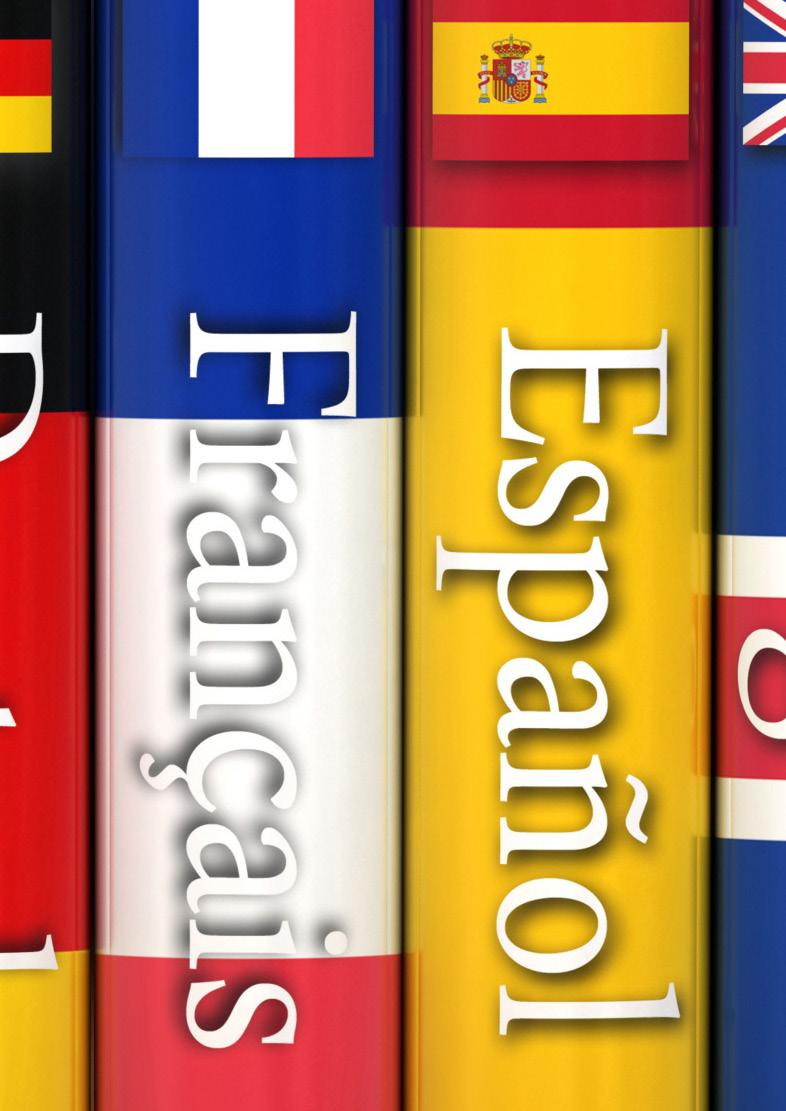
Why study Modern Foreign Languages?
“To have another language is to possess a second soul”, Charlemagne
Learning a modern foreign language can be a thrilling and enriching experience that opens up a world of opportunities. Not only will you gain valuable skills for future job prospects and international communication, but you’ll also broaden your cultural understanding and appreciation for different ways of life. Whether you’re planning to travel the world, meet new people, or immerse yourself in new cultures, having the ability to speak another language is an invaluable asset. And the best part? Learning a foreign language can be fun and fulfilling! From discovering new words and phrases to singing songs and watching movies in your target language, you’ll enjoy the journey as you build your language skills.
A new language could offer you:
• enhanced communication and adaptability skills
• deeper cultural awareness
• the edge in the jobs market
• flexibility to travel, study or work abroad
• French is one of the most widely spoken languages in the world, with over 200 million people using it as their first language.
• French is the second most studied language in the world, making it a valuable skill to have for future job opportunities.
• French is an official language of the United Nations, the European Union, NATO, and many other international organisations, making it a valuable tool for global communication.
• Learning French can improve cognitive skills such as problem-solving, critical thinking, and memory retention.
• French is a Romance language, which means that it is related to many other languages spoken in Europe, including Spanish, Italian, and Portuguese. This can make it easier for English speakers to learn.
• Knowing French can enhance cultural awareness and understanding of French-speaking countries and their customs, history, and literature.
• French is a popular tourist destination, and speaking the language can make travelling to France and other French-speaking countries much more enjoyable.
• Spanish is the second most widely spoken language in the world, with over 460 million native speakers.
• Spanish is the second most studied language globally, making it a valuable asset for future job opportunities.
• Spanish is the official language in 21 countries and is widely used in business, tourism, and international relations.
• Spanish is relatively easy to learn for English speakers, and can serve as a stepping stone to learning other Romance languages.
• Many famous works of literature, art, and music are in Spanish, giving students the opportunity to gain a deeper appreciation for these works.
• Studying Spanish can broaden students’ perspectives and enhance their understanding of different cultures, leading to greater empathy and appreciation for diversity.
• At Thomas’s College, students have the opportunity to study a Modern Foreign Language at GCSE: French or Spanish.
• The specification covers six distinct themes. Students are expected to understand and provide information and opinions about these themes relating to their own experiences and those of other people, including people in countries/communities where French and Spanish are spoken.
• Thematic context 1: My personal world
• Thematic context 2: Media & Technology
• Thematic context 3: Studying & my future
• Thematic context 4: Lifestyle & Wellbeing
• Thematic context 5: Travel & Tourism
• Thematic context 6: My neighbourhood
How will you be examined?
• Four skills are examined at GCSE: Listening, Reading, Writing and Speaking.
• Students may be entered for either Foundation Tier or Higher Tier but they must enter at the same Tier for all four skills.
• The exams will be measure how students have achieved the following assessment objectives:
Students must:
AO1 Understand and respond to spoken language in speaking and in writing
AO2 Understand and respond to spoken language in speaking and in writing
AO3 Demonstrate knowledge and accurate application of the grammar and vocabulary prescribed in the specification
Which exam board?
• Edexcel
What resources will be required?
Edexcel GCSE French Foundation & Higher
• Edexcel GCSE Spanish Foundation & Higher
• Activelearn: Resources, Digital book, Assessments, MarkBook
What potential school trips will you go on?
• Trips to France and Spain
• Educational visit to the French/Spanish Institute
• Cinema, art and theatre trips

Latin is interesting, not to mention fun if you like problem solving, code cracking and everything that goes along with learning new languages. The study of Latin also involves not just language, but Roman civilisation, as well as Latin literature.
Latin is a very rigorous subject. The language will help you to improve your understanding of English grammar, as well as your vocabulary and your ability to figure out the definitions of words based on the root word in Latin.
The wide range of skills you develop as you study Latin can be applied to any career you choose. Through analysis of the language you will develop problemsolving and code cracking skills, as well as the ability to explore and think deeply. The ability to be analytical is invaluable for any career path.
You can apply it to degree courses in Ancient or Modern Languages, English Literature, Ancient or Modern History, not to mention Classics, Classical Civilisation, Archaeology, Anthropology… the world is really your oyster. The key is to recognise the skills that you will develop, not necessarily the fact that you can read original Latin poetry.
You will be required to study a compulsory Language component together with either two Literature components, or one Literature component and the Literature and Culture component.
A GCSE in Latin will allow you to develop your knowledge of Latin vocabulary, morphology and syntax so that you can read and understand unseen confected or adapted passages of Latin.
The Language component will develop your knowledge of Latin vocabulary, morphology, syntax and linguistic structures through reading and studying texts and stories in Latin. You will then demonstrate your linguistic competence through the translation and comprehension of unseen Latin passages. You will also be able to demonstrate you linguistic ability by either recognising, analysing and explaining accidence and syntax within the context of a narrative passage or by translating short sentences from English into Latin.
The Literature components will require the study of between 110 and 120 lines of prose or verse material in Latin. These set texts will change every two years. Each component will develop your knowledge and understanding of the ancient world through the study of ancient literature, sources, and the cultural contexts in which they originated. These components assess learners’ ability to analyse, evaluate and respond to the ancient literature they have studied.
The Literature and Culture component will require the study of two different topics, from a rotating set that will change every two years. Study will take place through the exploration of prescribed sources, together with additional supporting sources which cover the same topic areas.
Course outline & How is it assessed?
Language
Learners study texts and stories in Latin to build knowledge and understanding of Latin vocabulary, accidence and syntax.
Prose and Verse Literature
Learners study Latin set texts and answer questions in English on aspects of content and analyse, evalute and respond to the ancient literature they have studied.
Literature and Culture
Learners study two topics on Roman Civilisation and Culture using the sources in the Prescribed Sources Booklet and answer questions in English on aspects of content, culture, social practices and values.
Compulsory component: J282/01: Language 100 marks 1 hour hour 30 minutes written paper
Optional components: any two of the following five:
J282/02: Prose Literature A
J282/03: Prose Literature B
J282/04: Verse Literature A
J282/05: Verse Literature B
J282/06: Literature and Culture
50 marks 1 hour Written paper
All components include synoptic assessment.
• OCR
resources will be required?
This component is worth 50% of total GCSE
Each component is worth 25% of total GCSE
• Textbooks are recommended according to the level of each students.
• Resources provided by the department for other components of the GCSE later in the year.
• Access to online resources and powerpoints linked to the GCSE papers.

Combined Award and Separate Sciences - what’s the difference?
All three sciences can be studied as part of the Double Award or as three separate Sciences. The main difference between the two is the amount of content.
Triple Science students study more content within their chosen science, whereas Double Award students cover approximately two thirds of the Triple Science content. In addition, Triple Science exams are slightly longer – usually half an hour longer than the Double Science exams.
Triple Science students receive a separate GCSE for each science, while students taking Double Science receive two combined GCSEs which are based on their overall performance across all three Sciences.
Do I need to study Triple Science in order to study a science at A Level?
No, it is not necessary to take Triple Science; you can do the A Level after having studied Double Science. However, Double Science students may find the requirements for the A Level sciences tougher to meet as they will have covered less material than those who have studied Triple Science.
Will I be entered for Higher or Foundation tier?
This decision will be made at the end of Year 10 by your teachers, in consultation with you and your parents. Ultimately we want to get the best grade possible for you.
To quote the Royal Society, “Almost any career benefits from the inquiring, innovating and questioning mindset that comes from studying Science. In a world of change there will always be careers that we can’t yet imagine; studying Science opens the door to thousands of jobs and careers, and gives you the skills and flexibility to choose what you want to do.”
So many jobs require an understanding of Science, it would be impossible to list them all. Apart from the obvious, such as research scientist, laboratory technician or Science teacher, they include jobs in engineering, healthcare, environmental work, architecture, construction and catering, to name but a few.
This course covers topics in all three Sciences:-
Biology
• Cell biology
• Organisation; Infection and response
• Bioenergetics
• Homeostasis and response
• Inheritance, variation and evolution
• Ecology
Chemistry
• Atomic structure and the periodic table
• Bonding, structure, and the properties of matter
• Quantitative chemistry
• Chemical changes
• Energy changes
• The rate and extent of chemical change
• Organic chemistry
• Chemical analysis
• Chemistry of the atmosphere
• Using resources
Physics
• Energy
• Electricity
• Particle model of matter
• Atomic structure
• Forces
• Waves (light and sound)
• Magnetism and electromagnetism
How will I be examined?
There are six papers: two biology, two chemistry and two physics. Each of the papers will assess knowledge and understanding from distinct topic areas. Each paper is 1 hour 15 minutes long.
Which exam board?
• AQA
Which resources will be required?
• AQA GCSE Biology for Combined Science (Trilogy) Student Book
• AQA GCSE Chemistry for Combined Science (Trilogy) Student Book
• AQA GCSE Physics for Combined Science (Trilogy) Student Book
• AQA GCSE Combined Science (9-1) Required Practicals Lab Book
Which potential school trips might I go on?
• The Science Museum
• The Natural History Museum
• Cern, Switzerland (3 days and 2 nights)
Biology is the study of life. Biologists study organisms (plants, animals and microorganisms) and the relationship they have with their environment.
Job titles you might see for biologists: Accountant, Bioengineer, Bioinformatician, Clinical technician, Curator, Doctor, Epidemiologist, Geneticist, Librarian, Mycologist, Neuroscientist, Patent lawyer, Press officer, Publisher, Teacher, Zoologist.
Science and Research – Other interesting science related roles would greatly benefit from your GCSE or further A Level study of Biology. You could use your skills to study crime scene evidence as a Forensic Scientist for example.
Medicine and Healthcare – Jobs like being a Doctor or Pharmacist typically require GCSE and A Level Biology to apply to medical school to study a degree in medicine. Genetic modification, neurotechnology and resurrecting extinct species are the new frontiers of Biology.
Sustainability – Your knowledge and interest in the environment and preservation would assist your work in agricultural roles like Farming, Ecology and Landscaping.
Sport and Fitness – Both GCSE and A Level Biology will contribute to careers in sports and fitness like Physiotherapy or Personal Training. Your comprehension of the body and the way it works would allow you to bring well-rounded knowledge to your role.
What will I study if I choose Biology?
• Cell biology
• Organisation
• Infection and response
• Bioenergetics
• Homeostasis and response
• Inheritance, variation and evolution
• Ecology
• Key ideas
How will I be examined?
• Two exams, each 1 hour 45 minutes long
• Exam 1 assesses topics 1-4
• Exam 2 assesses topics 5-7
Which exam board?
• AQA
Which resources will be required?
• AQA GCSE Biology Student Book
• AQA GCSE Biology (9-1) Required Practicals Lab Book
Which potential school trips might I go on?
• The Natural History Museum
• Juniper Hall Field Studies Centre
Chemistry is the study of matter, including its composition, properties, and structure; how it changes; and how it interacts with energy. Chemistry helps students to develop research, problem solving and analytical skills. It also helps students to challenge ideas and make reasoned arguments through logic and step-by-step reasoning. Chemistry often requires teamwork and communication skills too, which is great for project management.
• Analytical Chemist
• Chemical Engineer
• Chemistry Teacher
• Forensic Scientist
• Geochemist
• Hazardous Waste Chemist
• Materials Scientist
• Pharmacologist
• Toxicologist
• Water Chemist
• Many Chemistry students also find jobs outside of science in fields such as law, finance, journalism, the government and teaching
• Atomic structure and the periodic table
• Bonding, structure, and the properties of matter
• Quantitative chemistry
• Chemical changes
• Energy changes
• The rate and extent of chemical change
• Organic chemistry
• Chemical analysis
• Chemistry of the atmosphere
• Using resources
How will I be examined?
• Two exams, each 1 hour 45 minutes long.
• Exam 1 assesses topics 1-5.
• Exam 2 assesses topics 6-10.
Which exam board?
• AQA
Which resources will be required?
• AQA GCSE Chemistry Student Book
• AQA GCSE Chemistry (9-1) Required Practicals Lab Book
Which potential school trips might I go on?
• The Science Museum
• The Royal Society
If you like asking questions, Physics is the subject for you. Physics is the study of the universe from the largest galaxies to the smallest subatomic particles. Physicists investigate the laws that explain why all matter and energy in the known universe exists, where it comes from and how it behaves the way it does. By studying physics all physics students improve key skills, such as problem solving, research, and analysis of data. With these skills you will be able to test new ideas as well as question and investigate other people’s theories, which is useful for any kind of job that involves research or debate.
• Employers across a whole range of industries are desperate for people with physics skills. The range of careers open to people with physics qualifications is broad and varied:-
• Academic Researcher
• Astronomer
• Clinical Scientist
• Geophysicist
• Higher Education Lecturer
• Metallurgist
• Meteorologist
• Nanotechnologist
• Radiation Protection Practitioner
• Research Scientist
• Secondary School Teacher
• Sound Engineer
• Technical Author
• With their ability to ‘think big’, together with their transferable skills, Physics graduates often secure top management and policy positions. Areas like banking, finance, software, computing and consultancy industries all valuing skills from physics.
What will I study if I choose Physics?
• Energy
• Electricity
• Particle model of matter
• Atomic structure
• Forces
• Waves
• Magnetism and electromagnetism
• Space physics
How will I be examined?
• Two exams, each 1 hour 45 minutes long.
• Exam 1 assesses topics 1-4.
• Exam 2 assesses topics 5-8.
Which exam board?
• AQA
Which resources will be required?
• AQA GCSE Physics Student Book
• AQA GCSE Physics (9-1) Required Practicals Lab Book
Which potential school trips might I go on?
• The Science Museum
• The Natural History Museum
• Cern, Switzerland (3 days and 2 nights)
• Kennedy Space Centre, Florida (7 days and 6 nights)
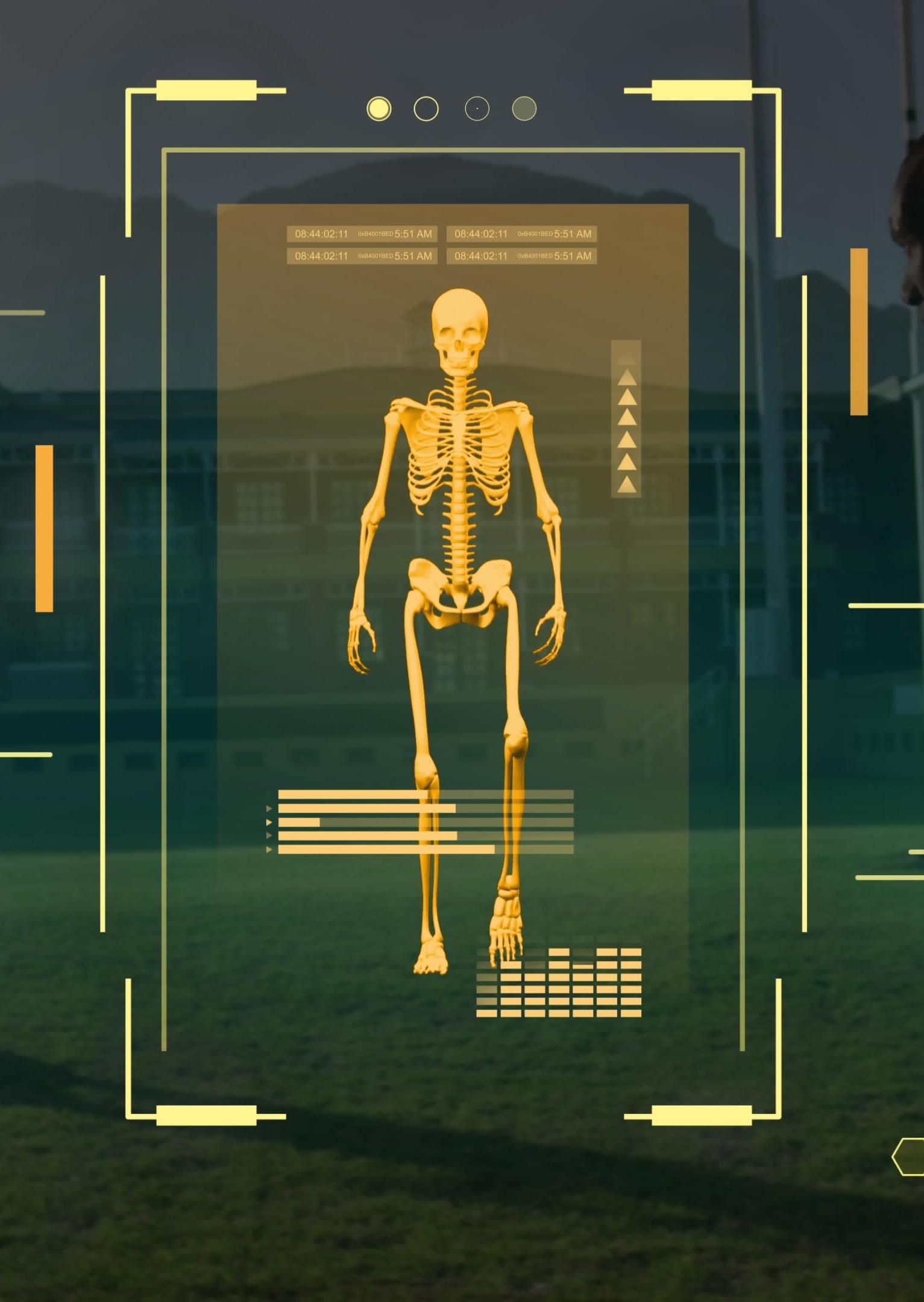
By studying GCSE PE you will have the opportunity to obtain insight and knowledge into the world of sports performance. You will gain the opportunity to perform in three different sports through the non-examined assessment component and develop a wide range of knowledge into physical activity and wellbeing. GCSE opens the door to a wide range of career options and enables you to develop vital skills which are needed in the workplace such as collaboration, communication and reflective analysis.
• Sports Science
• Sports Journalism
• Sports and Exercise Nutrition
• Physiotherapy
• Performance Analysis
• Strength and Conditioning Coaching
• PE teaching
• Sports coaching
• Youth Development
• Sport and Social Change
• Sport Psychology
• Sports Rehabilitation
• Sports Marketing
• Sports Performance analysis and talent Identification
Paper 1 - 1 hour 15 mins - 30% of GCSE What will you study if you choose
The Human Body and movement in Physical Activity and Sport
Applied anatomy and physiology:
• The structure and functions of the musculoskeletal system
• The structure and functions of the cardio-respiratory system
• Anaerobic and aerobic exercise.
• The short and long term effects of exercise
• Planes and axes of movement
• Effective use of a warm up and cool down
• Physical training
• How to optimise training and prevent injury
• Use of data
• Present and analyse data
Paper 2 - 1 hour 15 mins30% of GCSE
Socio-Cultural influences and well being in physical activity and Sport
Sports psychology:
• Classification of skills
• Goal setting and SMART targets
• Basic information processing
• Feedback on performance
• Mental preparation for performance
• Social Cultural influences:
• Engagement patterns in different social groups
Practical Performance - 30% of GCSE
Practical Performance in Physical Activity and Sport
Practical performance in three different physical activities in the role of player/ performer:
• One in a team activity, one in an individual activity and a third in either a team or an individual activity.
• For each of their three activities, students will be assessed in skills in progressive drills (10 marks per activity) and in the full context (15 marks per activity).
Coursework - 10% of GCSE
Analysis and evaluation of performanceto bring about improvement in one activity
Written or live spoken analysis and evaluation of performance to bring about improvement in one activity:
• Students will be assessed on their analysis (15 marks) and evaluation (10 marks) of performance to bring about improvement in one activity.
Which exam board?
• AQA
Which resources will be required?
• Textbook: Hodder Education AQA GCSE (9-1) ISBN: PE 978139832651
Which potential school trips might I go on?
Sports tours, sports matches, tours of venues and facilities. University visits to universities to use elite sport testing facilities. Copper box training gym.
Who should take PE?
• If you have an interest in living a healthy and active lifestyle
• If you are on the A team in two sports at Thomas’s
• If you participate in sports clubs outside of school
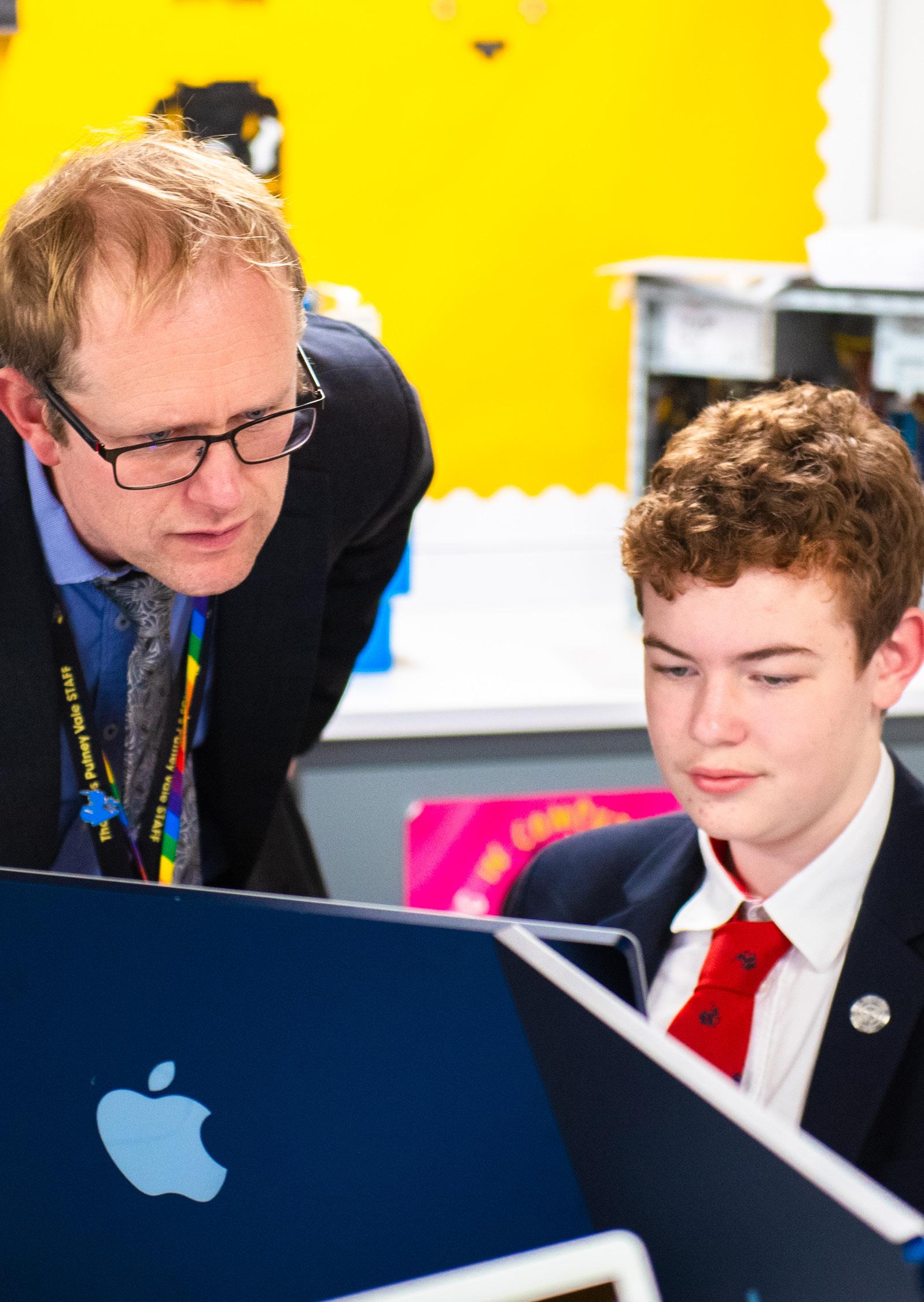
Computer Science gives you an excellent opportunity to investigate how computers work and how they’re used, and to develop computer programming and problem solving skills.
• Studying Computer Science empowers you to solve complex, challenging problems, enabling you to make a positive difference in the world.
• Computing skills are essential in a wide range of professions, from astronomy to financial analysis – not just in IT related jobs!
• There are many opportunities for travel and/or remote working for people with high-level computing skills.
• The future possibilities for people with Computer Science skills are unlimited, and these skills are only going to become more important.
• Computers are everywhere so understanding them puts you in charge of your world.
Computer Science is excellent preparation if you want to work or study in areas that rely on the skills you’ll develop, especially when they’re applied to technical problems. These areas include engineering, financial and resource management, science and medicine.
• Computational thinking – understanding of what algorithms are, what they are used for and how they work; ability to follow, amend and write algorithms; ability to construct truth tables.
• Data – understanding of binary, logic, data representation, data storage and compression.
• Computers – understanding of hardware and software components of computer systems and characteristics of programming languages.
• Networks – understanding of computer networks and network security.
• Issues and impact – awareness of emerging trends in computing technologies, and the impact of computing on individuals, society and the environment, including ethical, legal and ownership issues.
• Problem solving with programming:
o o o
Understanding what algorithms are, what they are used for and how they work in relation to creating programs
Understanding how to decompose and analyse problems
Ability to read, write, refine and evaluate algorithms and programs.
Component 1: Computer Systems
Written examination: 1 hour and 30 minutes
50% of the qualification
80 marks
Component 2: Computational thinking, algorithms, and programming
Written examination: 1 hour 30 minutes
50% of the qualification
80 marks
In addition to the two examined units, you will undertake several practical programming tasks to develop your programming skills in a high level language (Python). The skills you learn in the practical programming will be assessed in the component 2 exam.
Which exam board?
• OCR
Which resources will be required?
• GCSE Computer Science OCR (9-1) Complete Revision and Practice Publisher: CGP, ISBN-13: 9781789085587
Which potential school trips will you go on?
• The National Museum of Computing, Bletchley
Did you know that the first computers were people?! During this day you will go on a journey through time exploring why electronic computers were invented and get to see (and use!) key machines through history, from the birth of computing to today.

The future global challenges we face are economic. Coupled with a period of de-globalist policies and increasingly fluid flows of money, the challenge for young people is how to better understand the mechanics of the world around them and how to live within it. Studying business and economics allows a peek behind the curtain of these mechanisms that guide our lives and our behaviours. The Key Stage Four course looks to develop an understanding of key foundational business principles but also offers challenging content looking at the implications such as psychological frameworks due to economic theory, development of financial literacy and how we can further environmentalism through policy changes, among others. The subject opens a world of possibility to develop a range of integral and valuable skills, including:
Real-World Understanding – Learn how businesses operate, how economies function, and how government policies impact our daily lives. Gain insight into current affairs, from inflation and economic growth to ethical business practices and entrepreneurship.
Problem-Solving & Decision-Making Skills – Develop critical thinking by analyzing real-life case studies, making business decisions, and understanding market trends. These skills are invaluable for any future career.
Financial Literacy & Enterprise Skills – Gain essential knowledge on managing money, making informed consumer choices, and understanding the foundations of investment, savings, and taxation. This prepares students for financial independence.
Problem-Solving & Decision-Making Skills – Develop critical thinking by analyzing real-life case studies, making business decisions, and understanding market trends. These skills are invaluable for any future career.
In a world driven by economic and business decisions, this course empowers students with the knowledge, skills, and confidence to understand and shape the world around them. Whether they aspire to be future entrepreneurs, future political leaders, or simply want to make informed financial choices, Economics and Business provides a valuable foundation for success in both their academic and personal lives. This course culminates in a Thomas’s Qualification.

Studying English Literature will take you on a journey beyond your own experiences, helping you understand the lives, emotions, and challenges of others. Through exploring texts from different historical periods, cultures, and perspectives, you will expand your knowledge of societal issues and your understanding of human nature. This course complements the English Language GCSE by deepening your appreciation and understanding of language while exposing you to diverse text types and broadening your vocabulary. As philosopher Ludwig Wittgenstein said, “The limits of your language are the limits of your world.” By studying literature, you open your world to new ideas, histories, and cultures, enhancing your creativity and imagination. English Literature encourages you to think critically and empathetically, equipping you with skills and insights that will stay with you for life.
Where can English Literature take you?
Helps towards degree courses in…
English
Humanities
Philosophy, Politics and Economics (PPE)
Psychology
Law
Social and Political Science
Anthropology
Education
Linguistics
Liberal Arts
Helps towards careers in…
Law
Teaching
Government
Marketing
Public
Sector
Politics
Journalism
Publishing
Film production
Theatre production
What will you study when you study English?
AQA English Literature:
Paper 1
• Shakespeare and the 19th Century Novel
• Romeo and Juliet by William Shakespeare and A Christmas Carol by Charles Dickens
Paper 2
• Modern prose and poetry
• An Inspector Calls by J. B. Priestley; Power and Conflict poems by various poets; Unseen Poetry
Paper 1 is a 1 hour 45 minutes written exam, comprising 40% of the GCSE, while Paper 2 is a 2 hours 15 minutes exam, accounting for 60%.
Which potential school trips will you go on?
We are always on the lookout for theatrical performances of our set texts. In recent years, students have enjoyed theatre trips to see Dickens’ A Christmas Carol at the Old Vic, as well as performances of Romeo and Juliet and An Inspector Calls by visiting acting troupes.

Your Geography GCSE course has been designed to give you a broad understanding of global processes shaping the world today. From environmental concerns such as climate change and fracking, to the economic concerns such as debt in developing countries and inequality in the UK, the course will cover a vast array of topics seen in newsreels around the world.
By the end of the two years, you will be confident academically to perform well in your exams, but also moving forward into adult life, equipped with the knowledge to talk confidently on issues facing millions of people around the world.
Geography is a forward thinking subject, which will teach you about the past, present and future. The specific knowledge you learn will eventually fade from relevance, but the understanding of processes will remain with you for the rest of your life.
Where can Geography take you?
People with a knowledge of geography and geographic skills are extremely desirable to colleges and employers. During your course you will gain practical skills of how to conduct scientific research outdoors, learn how to interpret images, practical maths skills and write lengthy essays. It is this combination of skills that will allow you to access and be prepared for all types of further study. Furthermore, Geography graduates have the highest employment rate of any humanities subject, with a vast majority having ‘professional level’ jobs immediately after graduating. This shows how valuable skills learnt in geography lessons are in the workplace.
People who went to university with your geography teacher now work in established companies and organisations such as Transport for London, The Department for International Development, British Fashion Council, Savilles, British Land and Durham University.
What will you study if you choose Geography?
Component 1: Global Geographical Issues
• Hazardous Earth
• Development Dynamics
• Challenges of an urbanising world
Component 2: UK Geographical Issues
• The UK’s evolving physical landscape
• The UK’s evolving human landscape
• A fieldwork investigation
Component 3: People and Environment Issues- Making Geographical Decisions
• People and the biosphere
• Forests under threat
• Consuming energy resources
• Making a geographical decision
How will you be examined?
• Paper 1 - Topics, 1, 2 and 3 (1.5 Hours)
• Paper 2 - Topics 4, 5 and 6 (1.5 Hours)
• Paper 3 - Topics 7, 8 and 9 (1.5 Hours)
Which exam board?
• Edexcel
Grade 9-1 CGP Edexcel B Revision Guide
Publisher: CGP
ISBN: 9781782946212
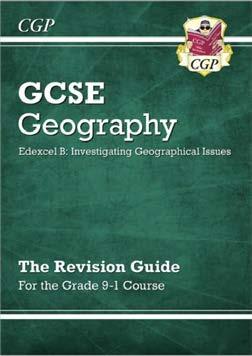

Grade 9-1 CGP Edexcel B Exam
Practice Workbook
Publisher: CGP
ISBN: 9781782946229


Grade 9-1 CGP Edexcel B Exam
Practice Answer
Publisher: CGP
ISBN: 9781782946236
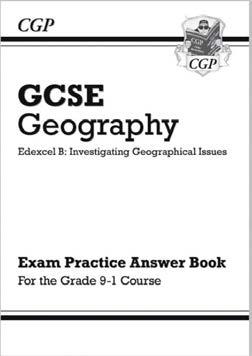

Which potential school trips will you go on?
Summer Term Field Trip to Brighton and Hove Costa Rica Rainforest/Ecotourism Trip

By studying GCSE History, you will prove your ability to develop and extend your knowledge and understanding of specific key events, eras and societies in national and world History. History helps us to understand the present and consider the impact of our actions on the future. History enables you to develop a variety of skills, including; communication and problem solving. You will become a successful independent learner and a critical and reflective thinker.
Where can History take you?
Helps towards degree courses in…
History
Politics
Archaeology
International Relations
Economics
English
History of Art
American History
Business Studies
Economics
Helps towards careers in…
Law
Politics
Public
Sector
Business
Marketing
Insurance
Archaeology
Economics
Teaching
Consultancy
What will you study if you choose History?
Paper 1: Thematic study and historic environment
• Crime and punishment in Britain, c1000–present and Whitechapel, c1870–c1900: crime, policing and the inner city.
Paper 2: Period study and British depth study
• British depth study:
• Early Elizabethan England, 1558–88.
• Period study:
• Superpower relations and the Cold War, 1941–91
Paper 3: Modern depth study
• Weimar and Nazi Germany, 1918–39
How will you be examined?
Paper 1: Thematic study and historic environment
Written examination: 1 hour and 15 minutes 30%* of the qualification 52 marks (16 for the historic environment, 36 for the thematic study)
Paper 2: Period study and British depth study
Written examination: 1 hour and 45 minutes 40%* of the qualification 64 marks (32 for the period study and 32 for the British depth study)
Paper 3: Modern depth study
Written examination: 1 hour and 20 minutes 30%* of the qualification 52 marks
Which exam board?
• Edexcel
Textbooks:
• Edexcel GCSE (9-1) History
Superpower relations and the Cold War, 1941–91 Student Book
• Edexcel GCSE (9-1) History
Crime and punishment through time, c1000–present
Student Book
• Edexcel GCSE (9-1) History Early Elizabethan England, 1558–1588
Student Book
• Edexcel GCSE (9-1) History
Weimar and Nazi Germany, 1918–1939 Student Book
Workbooks / revision books:
• Edexcel GCSE (9-1) History Workbook: Early Elizabethan England, 1558-88 by Tony Hier
• Edexcel GCSE (9-1) History Workbook: Weimar and Nazi Germany, 1918-39 by Philip Arkinstall
• Edexcel GCSE (9-1) History Workbook: Crime and Punishment in Britain, c1000present and Whitechapel, c1870-c1900 by Zoe Howells
• Edexcel GCSE (9-1) History Workbook: Superpower relations and the Cold War, 1941-91 by Neil Owen
• The Museum of London
• The Imperial War Museum
• Berlin, Germany (3 days and 2 nights)
• Whitechapel

Why study Theology & Philosophy?
If you find yourself asking the big questions of life, such as ‘What is the meaning of life?’, ‘Why does evil exist?’, and ‘What does it mean to be human?’, then Theology & Philosophy is for you.
In Theology & Philosophy, students investigate beliefs about God, the self and the nature of reality, issues of right and wrong and what it means to be human. Theology & Philosophy provides students with a unique opportunity to develop crucial academic skills, including argument construction, critical analysis, source analysis and reflexivity. It is a subject in which students engage with key theological and philosophical sources and thinkers while learning more about themselves and the world we live in as they do.
We live in a diverse and sometimes complicated society: understanding theological, ethical and philosophical ideas, beliefs and outlooks means we can have a deeper comprehension of the world we live in and the people within it.
Where can Theology & Philosophy take you?
Theology & Philosophy is a multi-disciplinary course which provides an excellent foundation for further study at A Level and beyond.
Theology & Philosophy helps towards degree courses in: Law
International
Sociology
Psychology
Anthropology
Philosophy, Politics & Economics (PPE)
Theology & Philosophy helps towards careers in:
Diplomacy
Education
The
Psychology
Counselling
What will you study if you choose Theology & Philosophy?
Component 1: Theology
• Christianity: Theological Beliefs and Teachings
• Christianity: Theology in Practice
• Judaism: Theological Beliefs and Teachings
• Judaism: Theology in Practice
Component 2: Philosophy
• Philosophical arguments for and against the existence of God
• Philosophical approaches to relationships and families
• Ethics: Religion, Peace and Conflict
• Ethics: Religion, Crime and Punishment
How will you be examined?
The GCSE course is examined by two 1 hour 45 minute examinations, both of which take place at the end of the course. There is no coursework.
Exam 1
• Component 1 (Theology: Christianity and Judaism)
• 50% of the final GCSE grade
Exam 2
• Component 2 (Philosophy)
• 50% of the final GCSE grade
Which exam board?
• AQA (GCSE Religious Studies): 8062
All compulsory resources will be loaned to students by the school upon commencement of the course.
Textbooks:
• AQA Religious Studies A: Christianity (Oxford University Press)
• AQA Religious Studies A: Judaism (Oxford University Press)
• Religious Studies for GCSE: Philosophy & Ethics, Dennis Brown
Workbooks / revision books:
• CGP AQA Religious Studies Revision Guide
• CGP GCSE Religious Studies: AQA A Exam Practice Workbook
• AQA Religious Studies A: Christianity & Judaism Revision Guide (Oxford University Press)
All students of Theology & Philosophy are encouraged to read widely around the subject. The school library is well-resourced with a range of theological and philosophical resources, and there is a departmental reading / watching list to guide students in their enrichment endeavours.
Books on the extended reading list include works such as:
• Theology: The Basics (A. E. McGrath)
• The Screwtape Letters (C. S. Lewis)
• Sophie’s World (J. Gaarder)
• Ethics Matters (P. & C. Vardy)
• The Puzzle of God (P. Vardy)
• Cafe Theology (M. Lloyd)
The Theology & Philosophy department is committed to offering a variety of enrichment opportunities to deepen students’ knowledge and understanding far beyond the GCSE curriculum. These enrichment opportunities include:
• Oxford University Faculty of Theology taster session
• Possible visit to Auschwitz to support students in their studies of Judaism and Ethics
• Possible visit to New York to support students in their studies of Philosophy and Ethics
• Notable speakers invited to deliver thought-provoking lectures
• Theology & Philosophy clubs and societies
• Philosothon competition
• Ethics Cup competition
• ISRSA essay competition
• The John Locke Institute of Philosophy essay competition
• The Royal Institute of Philosophy essay competition
• The University of Sheffield philosophy prize
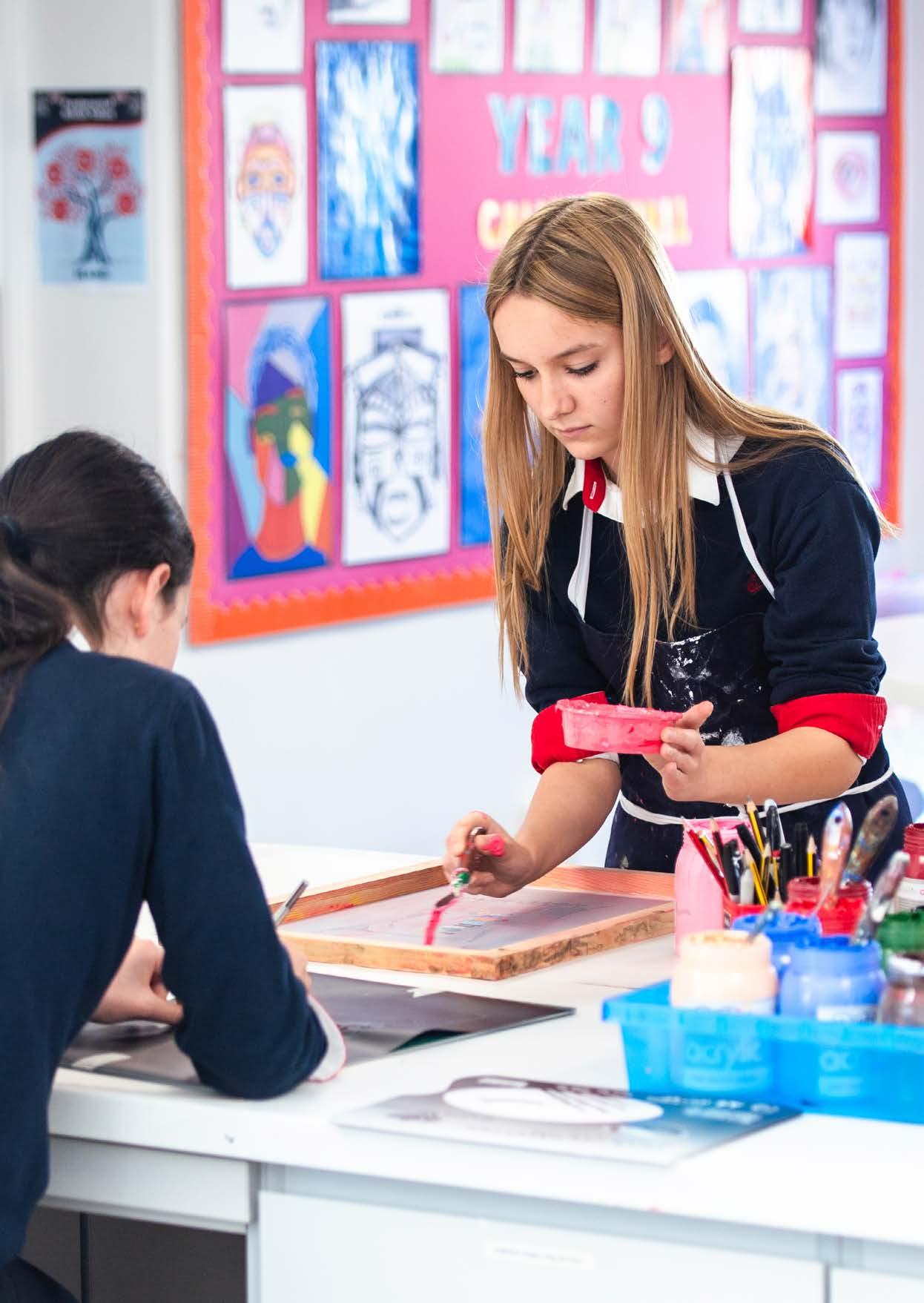
Which exam board?
• AQA
Why study Art?
Art is more than just a subject—it’s a pathway to self-expression, creativity, and personal growth. It fosters confidence, builds resilience, and enhances your ability to interpret and respond to the world around you. Art equips you with valuable skills, such as critical thinking and problem-solving, while also bringing joy and satisfaction through creative exploration.
“Creativity is critical thinking, and without it, how are you going to open up and ask harder questions? Art opens up those possibilities to think beyond what we already know.”
Catherine Opie, Artist
Studying Art develops determination, resilience, and adaptability—qualities beneficial in any career. It also prepares you for a wide range of further study and creative opportunities.
Helps towards degree courses in…
Art and Design
Textiles
Fashion
Photography
Illustration
Interior Design
Animation
Technical Arts and Special Effects
Film
Set Design
Sculpture
Media, Film and Theatre
Interior Design
Photography
Fashion and Textiles
Printmaking
Illustration
Graphic Design
Artist
Art Curator
Art Therapist
Visual Merchandising
Make-up
Artist
Throughout the course, you’ll explore a variety of artistic disciplines and techniques, including:
• Drawing
• Painting
• Sculpture
• Installation
• Photography and Moving Image
• Printmaking
• Mixed Media
• Land Art
Component 1: Portfolio (60% of GCSE | 96 marks)
What’s Assessed:
• A portfolio demonstrating explicit coverage of the four assessment objectives.
• The portfolio must include a sustained project that shows the journey from initial engagement to the realisation of your final piece, alongside a selection of other work produced during the course.
Assessment Objectives:
• AO1: Develop ideas through investigations, demonstrating critical understanding of sources.
• AO2: Refine work by exploring ideas, selecting and experimenting with appropriate media, materials, techniques and processes.
• AO3: Record ideas, observations and insights relevant to intentions as work progresses.
• AO4: Present a personal and meaningful response that realises intentions and demonstrates understanding of visual language.
How It’s Assessed:
• No time limit
• Teacher-assessed and externally moderated
Component 2: Externally Set Assignment (40% of GCSE | 96 marks)
What’s Assessed:
• Students respond to a starting point from an externally set assignment paper. The work must demonstrate coverage of all four assessment objectives.
How It’s Assessed:
• Preparatory period followed by 10 hours of supervised time to create a final piece or series of outcomes.
• Teacher-assessed and externally moderated
Resources Required
• A3 sketchbook (essential)
• A variety of drawing and painting materials (recommended for home use)
To enrich your understanding of Art and inspire your creativity, you may visit:
• Tate Modern
• Tate Britain
• Victoria & Albert Museum
• Royal Academy of Arts
• National Gallery
• St Ives
GCSE Art provides an opportunity to explore your creativity, develop valuable skills, and lay the foundation for a future in the Arts. Whether you aspire to pursue a creative career or simply want to broaden your artistic abilities, this course offers the perfect starting point.
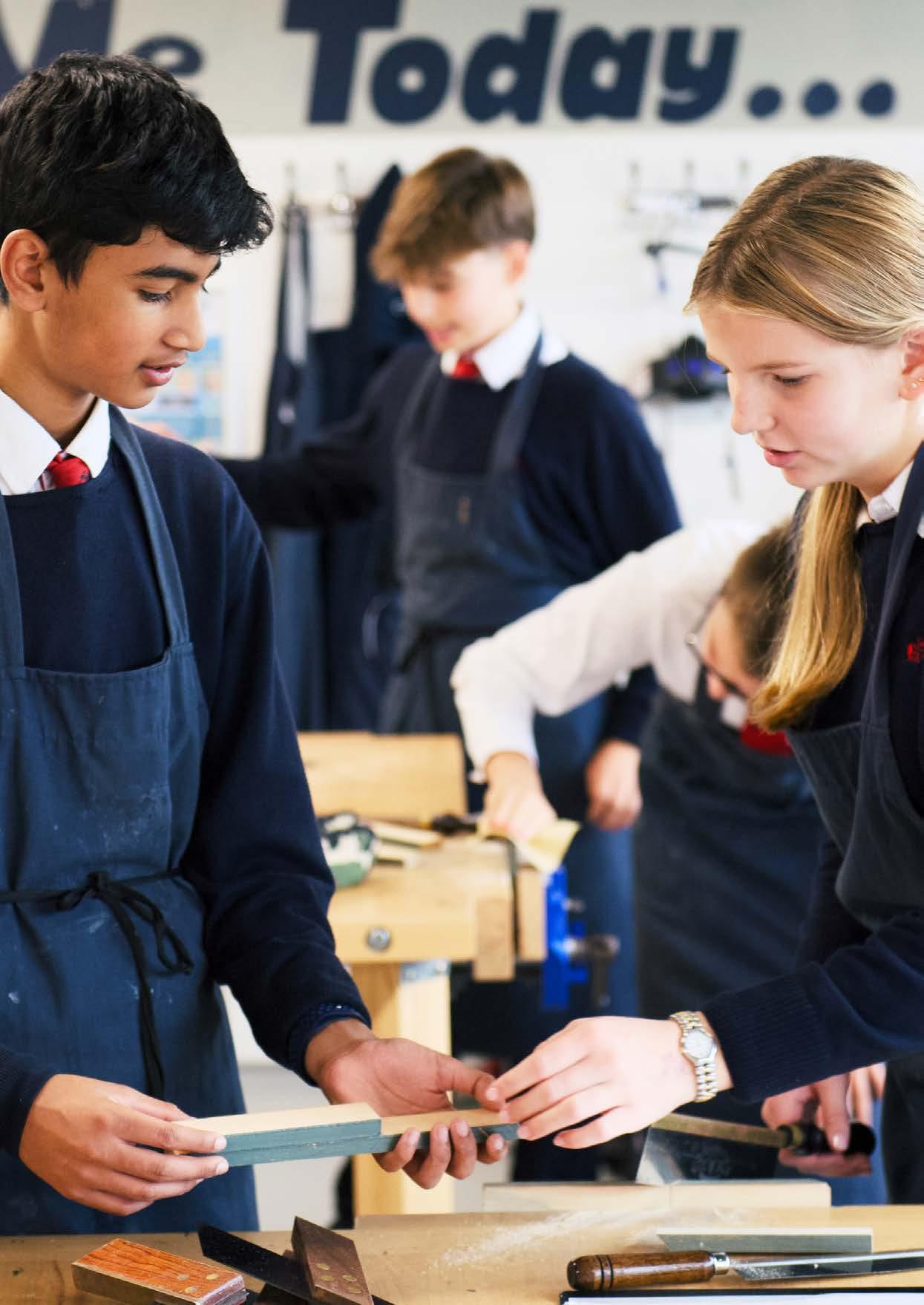
Through Design and Technology students will explore a broad, deep and inspiring curriculum.
To gain this GCSE, each student creates a unique product portfolio and creates a prototype for their own product. Just as designers do in industry, they respond to a context or situation, identify problems to solve and create their own primary research, as well as drawing from secondary sources.
As this subject combines technical details with creativity, it can provide useful consolidation of maths and science knowledge, and provide fun, hands-on making experiences.
Where can Design and Technology take you?
Helps towards degree courses in…
Architecture
Graphic Design
Engineering
Industrial Design
Mechanics
Product Design
Interior Design
Environmental Engineering
Landscape Architecture
Civil/Mechanical Engineering
Art and Design
Furniture Design
Game Design
Helps towards careers in…
Engineering
Architecture
Graphics
Information technology
Interior design
Industrial and product design
Renewable energy
Civil engineering
Carpentry
UI/UX
Landscape Architecture
Paper 1: Section A - Core technical principles
Students will develop a breadth of core technical knowledge and understanding that consists of:
• materials and their working properties
• energy generation and storage
• developments in new materials
• systems approach to designing
• mechanical devices
Paper 1: Section B - Specialist technical principles
In addition to the core technical principles, students will develop an in-depth knowledge and understanding of the following specialist technical principles:
• selection of materials or components
• forces and stresses
• ecological and social footprint
• sources and origins
• using and working with materials
• stock forms, types and sizes
• scales of production
• specialist techniques and processes
• surface treatments and finishes.
Paper 1: Section C - Designing and Making Principles
Students will need to demonstrate and apply knowledge and understanding of designing and making principles in relation to the following areas:
• investigation, primary and secondary data
• environmental, social and economic challenge
• the work of others
• design strategies
• communication of design ideas
• prototype development
• selection of materials and components
• tolerances
• material management
• specialist tools and equipment
• specialist techniques and processes
What will you study if you choose Design and Technology?
How will you be examined?
Component 1: Design and Technology GCSE
Written exam: 2 hours, 100 marks, 50% of GCSE
Component 2: Non-exam assessment (NEA): A design project portfolio consisting of 20 pages of A3 or equivalent, taking approximately 30–35 hours, 100 marks, 50% of GCSE
Which exam board?
• AQA
Which resources will be required?
Textbooks:
• AQA GCSE (9-1) Design and Technology
• Publisher: PG Online, ISBN-13: 9781910523100
• AQA GCSE (9-1) Design and Technology: All material categories and systems
• Publisher: Hodder Education, ISBN-13: 978151040108
Workbooks / revision books:
• The Design Museum
• The V&A
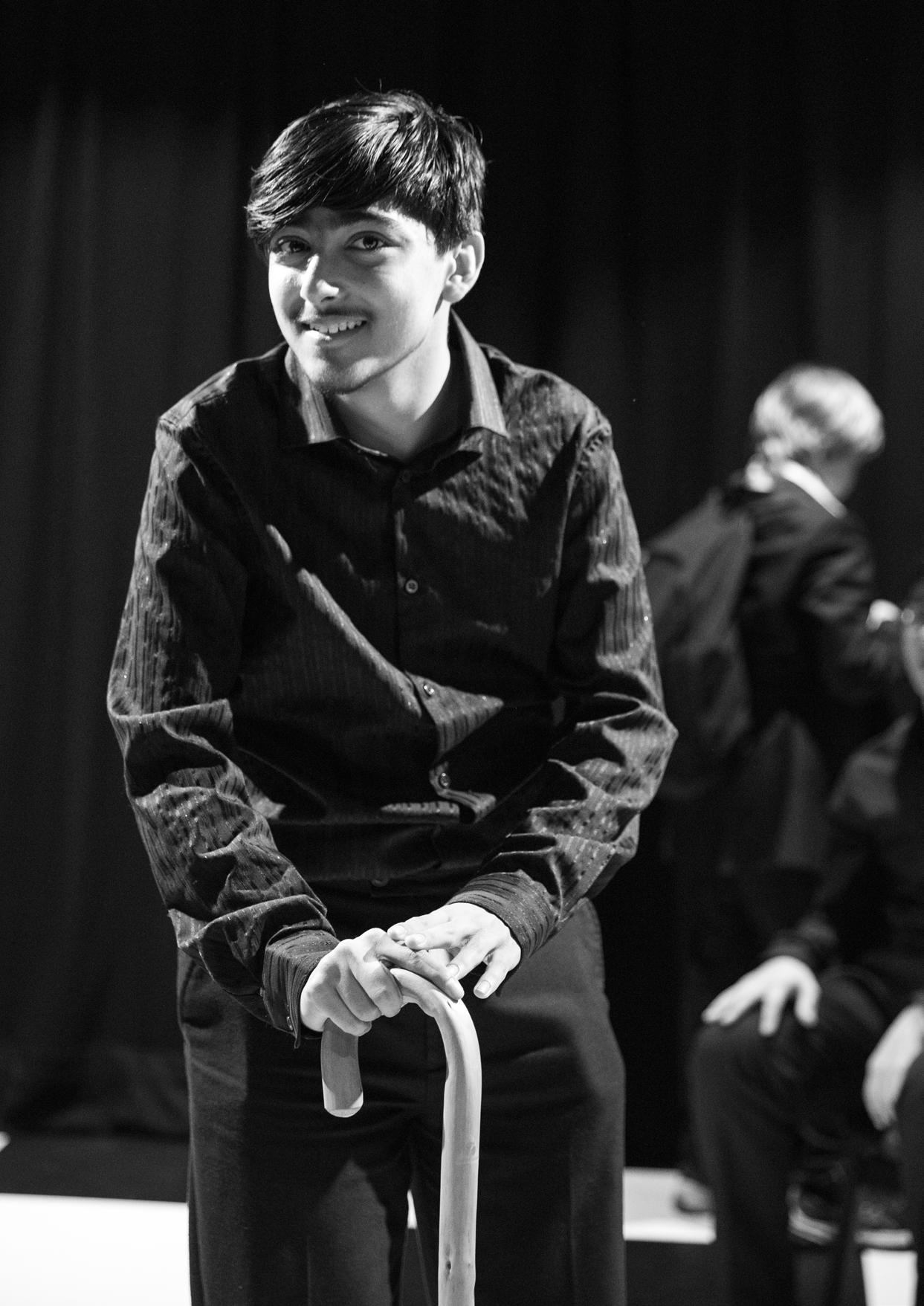
• No subject teaches you how to work well in a team quite like Drama. It will allow you to develop your generosity, patience, ability to compromise and communication skills.
• You will learn perseverance. This skill also makes you more able to adapt your behaviour for various situations.
• In Drama you will be asked to improvise. This allows you to think on your feet, develop your leadership skills and become more proactive.
• Drama stimulates you to be constantly creative. You will regularly come up with exciting, functional and convincing ideas to a deadline.
• When you act in Drama you develop humility by putting yourself into another person’s shoes in order to identify with them. This will open your mind and improve the way you interact with people.
• Analysing Drama productions allows you to develop your critical thinking skills.
• You will gain confidence. You will be able to develop your performance skills and overcome the fear of making mistakes in a fun, creative and supportive environment.
Where can Drama take you?
Helps towards degree courses in…
Drama & Theatre Studies
Music
Design
English Language & Literature
Performing Arts
Creative Writing
Dance
Technical Theatre
Psychology
Business
Broadcasting
Journalism
Helps towards careers in…
Actor
Broadcast presenter
Community arts worker
Dramatherapist
Runner, broadcasting/film/video
Theatre director or Manager
Theatre stage manager
… and these jobs with transferable
Drama skills:
Arts administrator
Choreographer
Teacher
Media researcher
Music producer
Special effects technician
will you study and how will it be examined?
Title DevisingComponent 1
What Will I Do?
What skills are being assessed?
*AO = assessment objective
What’s the exam or assessment?
Perform a devised, group piece and create a portfolio about the process. Evaluate the work and key skills included.
AO*1
Create and develop ideas to communicate meaning for theatrical performance
Performance from Text - Component 2
Perform two extracts from a text, for example ‘Blood Brothers’ or a play different from the set text in C
AO*2
Apply theatrical skills to realise artistic intentions in live performance
Theatre Makes in Practise and live theatre reviewComponent 3
Explore one play in depth (for example ‘Blue Stockings’ and learn about the process of creating a play. Review a piece of live theatre exploring technical elements
AO*3
Demonstrate knowledge and understanding of how drama and theatre are developed and performed
AO*4 Analyse and evaluate your own work and the work of others
Assessed by your teacher and moderated by an examiner.
Assessed by a visiting examiner or recorded and sent to the exam board.
Written examination 1 hour 45 minutes.
Which exam board?
• Edexcel
Which resources will be required?
• Copies of the set texts
Which potential school trips will you go on?
• Theatre trips to see major productions for review purposes, such as ‘Operation Mincemeat’

“Music gives a soul to the universe, wings to the mind, flight to the imagination, and life to everything.” – Plato
Music is an academic subject in its own right, but it actually benefits other subjects too. A recent study in the UK found that playing a musical instrument appears to enhance general performance in other subjects at GCSE (Cambridge Assessment, 2020). Other studies have shown that music benefits learning by activating all areas of the brain: auditory (sound processing); motor (rhythm processing); and limbic (emotions).
GCSE music involves written, analytical, practical and social/personal skills such as:
• Independent learning: having to be disciplined about practising
• Team work: particularly if you’re involved in groups or ensembles, concerts and performances
• Performance and presentation skills which are useful for any job/career
• Listening: this is highly developed in musicians and is an important part of the course
• Analytical and essay-writing skills
• Confidence and self-esteem: which has a knock-on effect in all areas of life and learning
• Creativity and self-expression: helping young people to think differently and harness the power of their imagination
If you are an aspiring musician and can sing or play an instrument to Grade 4 or Grade 5 standard then this is the course for you.
• Solo and ensemble performance
• Composition and arranging
• Creative project work (improvisation, collaborations with dance, music technology)
• Instrumental/vocal teaching/project leadership
• Community project work
• Collaborative projects with
• other media/art forms
• Arts administration and management
• Copyright administration in composition and recordings
• Librarianship
• Management, representation and promotion
• Music publishing
• Music therapy
• Production, retailing and distribution of music instruments
• Production, distribution and retailing of sound recordings
There are three components of study in Music GCSE: Performing, Composing and Appraising.
Component
Component 1 Performing 30% (Non-examined assessment)
2 performances
Solo - minimum 1 pieceminimum 1 minute
Ensemble - minimum 1 piece - minimum 1 minute
Together total minimum of 4 minutes across the solo and ensemble pieces
Minimum total
2 pieces
30 marks each
Total of 60 marks
Component 2 Composing 30% (Non-examined assessment)
Component 3 Appraising 40% (Exam)
2 compositions
1 to set brief – minimum 1 minute
1 free composition – minimum 1 minute
Together total minimum of 3 minutes
4 Areas of Study with 2 Set Works each:
• Instrumental Music 1700–1820
• Vocal Music
• Music for Stage and Screen
• Fusions
2 pieces
30 marks each
Total of 60 marks
Exam 1hr 45mins
Total of 80 marks
Which exam board?
• Edexcel
Which resources will be required?
• Step Up To GCSE Music by Paul Terry (Rhinegold Publishing)
Edexcel GCSE Music
• Study Guide by Paul Terry(Rhinegold Publishing)
Edexcel GCSE Music
• Listening Tests by Simon Rushby (Rhinegold Publishing)
Edexcel GCSE Music
• Revision Guide by Paul Terry (Rhinegold Publishing)
Which potential school trips will you go on?
• Attend Classical Concerts featuring leading orchestras and performers at some of the world’s greatest venues including the Royal Albert Hall, the Southbank Centre and the Wigmore Hall.
• Visits to see Operas and Musicals in London’s West End.
• Music Tours to Europe